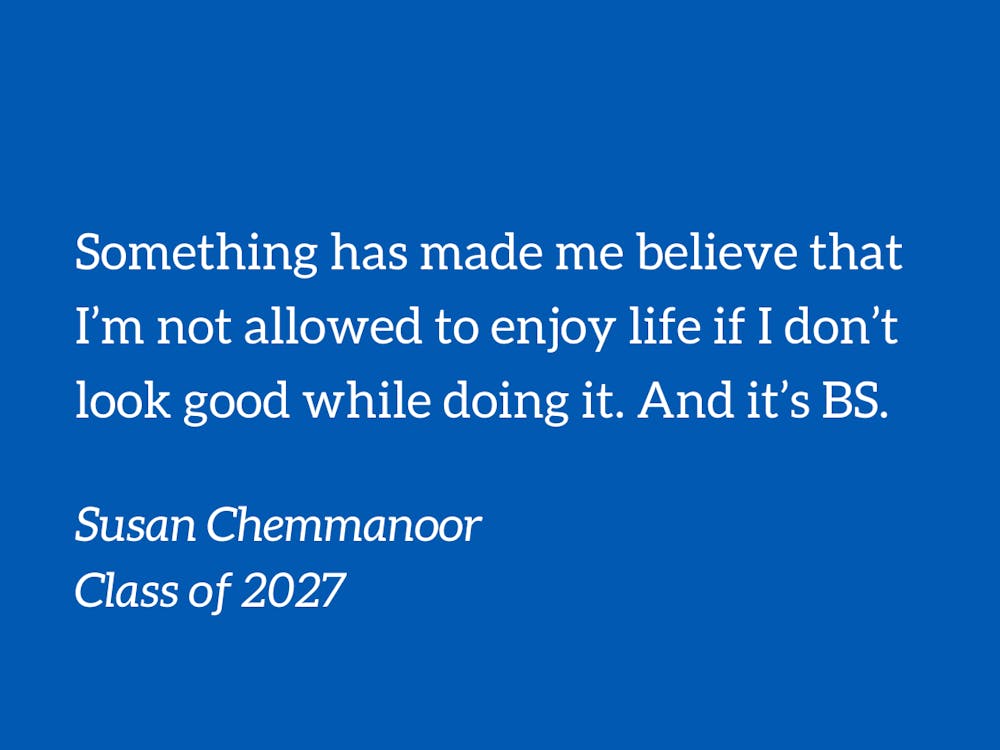I have a confession to make. I didn’t wear concealer to class today, and somehow, I haven’t spontaneously combusted yet. I know that doesn’t sound revolutionary, but for me it is.
When I was a kid, I thought I would have it all together by 18. I thought acne would become an ancient relic of the past. I thought my hair would magically never frizz again. I thought college was this utopia where the perfect adult me would do her perfect homework with perfect hair for four years and then live happily ever after. Now, the younger version of me has become disillusioned, but her expectations still linger.
I waste so much of my day being concerned about how I’m being perceived. The number of minutes spent on fixing my bangs after a gust of wind — god forbid someone actually sees my forehead — is astounding. I’ve been thinking about why I do this- why I care so much about whether people like what they see when they look at me. It’s boiled down to one thing: something has made me believe that I’m not allowed to enjoy life if I don’t look good while doing it. And it’s BS.
It’s a mythical expectation for a woman who simply doesn’t exist. Let’s talk about where it comes from. I could harp on social media and TikTok’s obsession with giving women elusive microtrends and new insecurities, but I’d risk sounding like a broken record. We know social media is bad for our mental health. So let me talk about something a little more subtly insidious: makeover movies.
Now listen, I’m a sucker for “Princess Diaries” as much as the next person. Makeover movies are cutesy and enjoyable to watch, but at their core, they make a strange claim about who deserves respect in society. In “Princess Diaries,” Anne Hathaway’s Mia Thermopolis is finally treated like a human being after she straightens her hair and wears contacts. In “Miss Congeniality,” Sandra Bullock’s FBI agent character Gracie stops getting harassed by her male colleagues when she wears a tight dress and gets a blowout. She’s finally a “real woman” when she wears mascara. Time after time, these movies perpetuate the belief that a woman’s only way to earn respect or to feel confident is to be perceived as beautiful by the men around her –that her only mechanism of upward social mobility is her forced ultra-femininity. These makeovers tend to lead women to lose their sense of self rather than find it.
To put it simply, as one of my favorite video essayists Mina Le says, we’ve outgrown the ugly duckling transformation. Thus, I find more solace in movies that are slightly more self-aware about the shortcomings of the makeover trope. In “Mean Girls,” Lindsay Lohan’s Cady Heron realizes that she doesn’t have to force herself to be the ultra-feminine apex predator to like herself. In “The Devil Wears Prada,” Anne Hathway’s Andy eventually returns to her simple lifestyle after being exhausted by performing the role of the alluring fashion it-girl. While these movies are still flawed, they tell a different story than the traditional makeover movie. They place the power of identity in the woman’s hands rather than in the perception of the men around her. They tell a story of unconditional respect without a basis in physical appearance. That’s what I’m trying to get myself to understand. We deserve respect whether we have acne or not. We’re allowed to have fun and be boisterous even when we’re not wearing our best outfits.
Now, back to the concealer. Today, even though my eye bags were on display, I still enjoyed my lunch; I still listened to good music; and I still laughed with my friends. There is a quiet power in accepting that sometimes, you’re not going to look your best. There is something radical about knowing that you’ve looked better and carrying on with your day. Allowing yourself to take part in all the pretty things life has to offer while not feeling pretty is liberating. Taking up space and feeling at home in your skin is possible with frizzy hair. So, embrace the ugly —I swear it makes life more worth living.
Susan Chemmanoor is a Trinity first-year. Her column typically publishes on alternate Fridays.
Get The Chronicle straight to your inbox
Signup for our weekly newsletter. Cancel at any time.
Susan is a freshman in Trinity. Her columns run on alternate Fridays.

